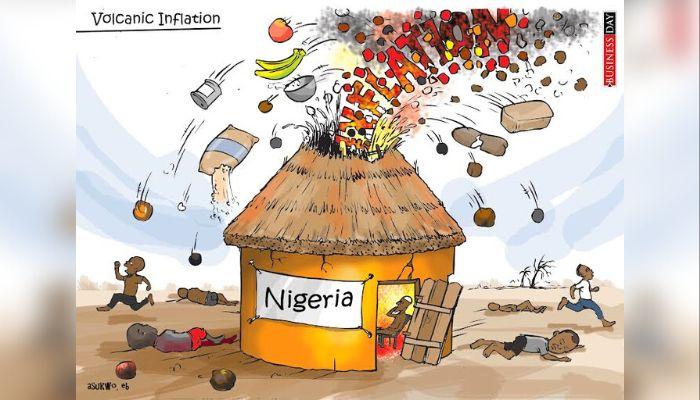Nigerian consumer prices climbed at the fastest annual pace in 20 years in December, the National Bureau of Statistics reported today.
BusinessDay analysis of Nigeria’s inflation rate shows that it is the highest since January 2003.
The Consumer Price Index report shows that prices rose to 28.92 percent in December 2023 compared with 28.20 percent in November.
They also revealed that food inflation, which constitutes 50 percent of the inflation rate, rose to 33.93 percent in December from 32.84 percent in November.
The rise in food inflation on a year-on-year basis was caused by increases in prices of oil and fat, bread and cereals, potatoes, yam and other tubers, fish, fruit, meat, vegetables milk, cheese, and eggs.
Economists had projected that December’s rate would exceed November’s eighteen-year high of 28.2 percent. A report by analysts at KPMG has projected that inflation to hit 30 percent by December 2023 as a result of the combined influence of fuel subsidy removal and foreign exchange liberalisation.
Cardinal Stone analyst in its 2024 Economic Outlook report said that inflation closed at a 27-year high,
A breakdown of the NBS’ latest consumer price index report shows that food and non-alcoholic beverages contributed the most (14.98 percent) to the increase in the headline index, followed by housing water, electricity, gas, and other fuel (4.84 percent), clothing and footwear (2.21 percent), transport (1.88 percent), furnishings and household equipment and maintenance (1.45 percent) and education (1.14 percent).
Others are health (0.87 percent), miscellaneous goods and services (0.48 percent), restaurants and hotels (0.35 percent), alcoholic beverages, tobacco and kola (0.31 percent), recreation and culture (0.20), and communication (0.20 percent).
“On a year-on-year basis, the headline inflation rate was 7.58 percent points higher compared to the rate recorded in December 2022, which was 21.34 percent. This shows that the headline inflation rate (year-on-year basis) increased in December 2023 when compared to the same month in the preceding year (i.e., December 2022)” the report said.
Furthermore, on a month-on-month basis, the headline inflation rate in December 2023 was
2.29 percent, which was 0.20 percent higher than the rate recorded in November 2023. This means that in December 2023, the rate of increase in the average price level is more than the rate of increase in the average price level in November 2023.
Core inflation, which excludes the prices of volatile agricultural produces and energy stood at 23.06 percent in December 2023 on a year-on year basis; up by 4.85 percent when compared to the 18.21 percent recorded in December 2022
The highest increases were recorded in prices of Passenger Transport by Road, Medical Services, Passenger Transport by Air, Actual and Imputed Rentals for Housing, Pharmaceutical products, Accommodation services, etc.
Except for a brief pause in Dec 2022, Nigeria’s inflation reading has steadily increased since Feb 2022, an eleven-month consecutive high.


